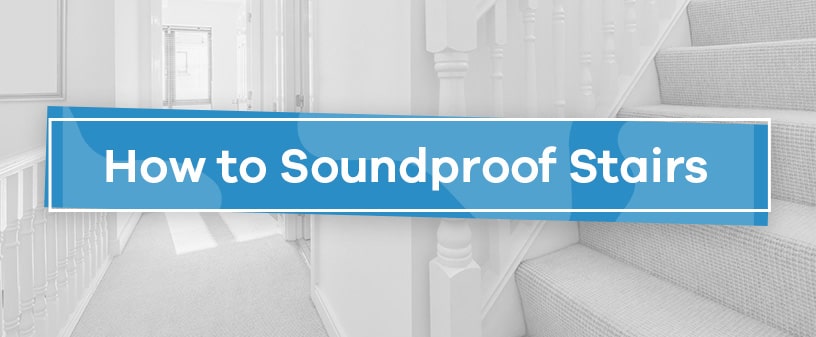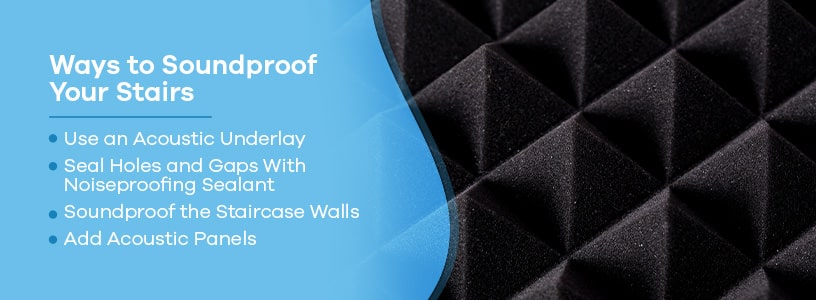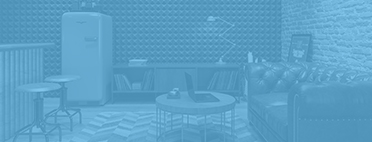
Sound presents unique challenges in buildings of all styles and sizes. Multi-story buildings face an uphill battle. Their stairwells can create common acoustic issues, disturbing people upstairs, downstairs and in between.
Soundproofing noisy stairs can make your building quieter and more comfortable. The experts at Soundproof Cow know multiple ways to improve stairwell acoustics in homes, apartments, schools and beyond. In this article, we will show you how to reduce the unwanted noise on stairs so you can enjoy peace and quiet throughout your space.
Reasons to Soundproof Your Stairs
Soundproofing your stairs is always a good idea, whether they are in a multi-family apartment building or your family’s private home. Here are some reasons why you should soundproof your stairs:
- Follow noise regulations: Soundproofing can help satisfy noise transfer regulations for apartment complexes and multi-family residences by reducing the amount of noise that stairs can easily transfer between floors or units.
- Reduce distractions: Reducing noises in a school or office’s stairwell can help people on either end stay focused as others walk and talk.
- Enjoy a more peaceful living situation: Minimizing noise transmission and reflections in a stairwell can help you feel more comfortable and peaceful in your home while relaxing or working.
Why Are Stairs Hard to Soundproof?
Stairwells raise acoustic challenges. Some of their characteristics naturally funnel noise between floors, amplify harsh sounds and travel through the entire building. Here are some challenges of soundproofing stairs:
- Floor-to-floor structural connection: Stairwell frames physically connect the top and bottom floor, transmitting vibrations between levels.
- Reflective surfaces: Hard walls, steps and platforms reflect sound, allowing it to travel with little obstruction.
- Close walls: The short distance between reflective surfaces strengthens reflections, resulting in long, loud reverberations.
- Gaping entry and exit points: Soundwaves can enter and exit the stairwell with ease.
- Inconspicuous cracks and gaps: A small air gap can leak sound into adjacent rooms.
- Heavy foot traffic: Footsteps create low-frequency structural vibrations that are difficult to isolate.

Ways to Soundproof Your Stairs
Now that you understand some of the reasons you should soundproof your stairs and the challenges you will face in the process, you can learn how to do it. Here are eight ways you can enjoy a quieter staircase in your home, business or apartment building.
1. Use an Acoustic Underlay
Various flooring underlayment products can help reduce the noises you hear from your staircase, whether you are above or below it. Acoustic underlay provides a layer of vibration and sound-absorbing padding in the floor. This layer can reduce the sound you hear from your staircase and is especially helpful in soundproofing stair treads as people walk on them.
Using an acoustic underlay may require some work to install, but the degree of difficulty varies depending on the project’s scale. The results of having a quieter staircase will be worth the effort. If your office is below a staircase or the sound of shoes on stair treads drives you crazy, acoustic underlay can help reduce the sound to give you a quieter experience in your building.
2. Install Carpeting Over the Steps
A carpet can provide some relief from excessive staircase noise. Airborne sound reflects freely off hard surfaces like wood, concrete, tile and other common building materials. A soft carpet offers absorbent properties that can weaken reflections. They also soften the impact of footsteps, dampening structural vibrations as people use the stairs. Acoustic underlays pair well with carpeting — you can cover the underlay with a carpet to conceal it and compound the effects.
3. Seal Holes and Gaps With Noiseproofing Sealant
Soundwaves are sneaky little things. They can travel through even the tiniest crack in a structure or wall, causing people on the other side to hear whatever is making the noise. The same fact applies to your staircase. Holes or gaps in your staircase could be letting sound through, leading to louder noises echoing through your home and more distractions reaching your ears.
Holes in your staircase could be a sign that it is time to make repairs. One of the first actions you could take is to fill these holes and gaps with a noise-proofing sealant or another insulating material. Filling these gaps will isolate sounds from the staircase from traveling to other parts of your home, business or apartment complex.
4. Soundproof the Staircase Walls
Your stairwell’s walls play a critical role in the level of sound that comes from your staircase. Since your staircase walls contact the stair treads and other parts of the staircase, vibrations from every step can travel through the walls and into other areas of the building. Take even more control of your staircase’s noise level by soundproofing its walls.
The first way you can soundproof your staircase walls is with Green Glue Noiseproofing Compound. Use this glue between layers of drywall to take your staircase’s soundproofing to the next level. Green Glue absorbs the vibrations between the layers so less sound can travel between rooms. With the consistency of ketchup and easy application, Green Glue makes soundproofing easy. Apply it directly over your existing wall to get fast soundproofing benefits.
5. Insulate the Stairwell Walls
Another method for soundproofing your stairwell’s walls is by using Quiet Batt® Soundproofing Insulation within the walls themselves. It is a cotton-based material that can absorb sound in addition to heat. Insulation helps to improve the benefits of wall decoupling by dispersing some of the sound energy that permeates the adjacent drywall.
When doing a new construction project or making renovations, add Quiet Batt® between the studs of your stairway walls to maximize all the benefits of its soundproofing capabilities. You will enjoy better climate control and excellent sound absorption as a result.
6. Insulate the Under the Stairs
You can insert insulation under the steps if you can access the space beneath them. To insulate under the stairs, cover a portion with drywall. Then, slide insulation into the space between the drywall and the bottom of the stairs. Repeat these steps a few stairs at a time until you have built a diagonal insulated ceiling.
7. Add Acoustic Panels
Sound-insulating acoustic panels are the answer when you prefer to avoid invasive sound-absorbing measures. Acoustic panels are attractive pieces of fabric wrapped panels, foam or perforated wood that are perfect for absorbing sound in your stairway. Hang them in the following locations to enjoy their sound-dampening effects:
- Your stairway walls
- The ceiling above the stairs
- At the entrance or exit of the stairwell
Consider adding acoustic panels to your stairwell in addition to some of the other soundproofing methods mentioned above. All of these actions will result in a quieter staircase that promotes a more peaceful home, workplace or apartment building.
8. Cover the Entryway
Physical barriers block sound, but many stairwells are wide open at either end. The soundwaves that reflect and reverberate inside the stairwell exit freely. Stairwells funnel sound between floors, too. Placing a physical barrier at the top and bottom of the stairs can prevent noise from reaching rooms on either end.
A door is the most effective and practical barrier to install. Closed doors block noise, and there are various ways to enhance a door’s soundproofing capabilities — especially if the door is hollow. Alternatively, you can soundproof without a door by strategically placing furniture, drapery or temporary acoustic barriers in the path. An acoustic quilt or an acoustic partition can reduce transmission and absorb airborne noise.
Buy Soundproofing Materials From Soundproof Cow
Soundproof Cow is your destination for the soundproofing materials you need to enjoy a quieter space. Our high-quality products will help you absorb sound in the areas of your building that need it most. Take control of sound levels and experience the pleasure of an acoustic treatment with Soundproof Cow’s soundproofing materials today.
Contact us online or call us at 844-864-5389 for more information. We look forward to helping you enjoy a quieter staircase and a better quality of life!








